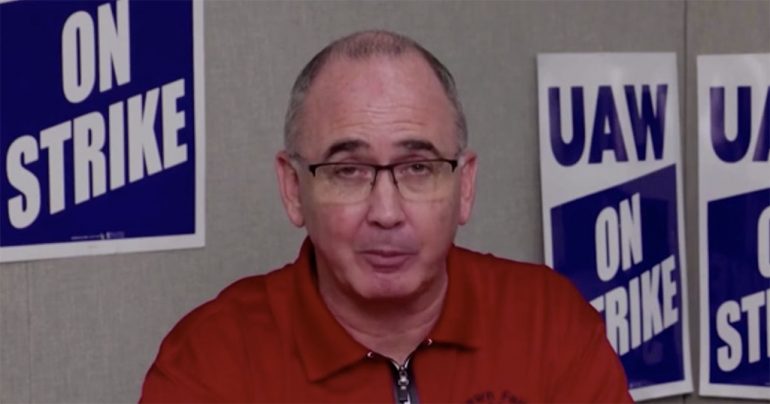
The United Auto Workers (UAW) union has reached a milestone in its ongoing labor negotiations, striking a tentative deal with Ford Motor, one of Detroit’s Big Three car manufacturers. This development is a pivotal moment in a series of strikes that have seen 45,000 workers walk off the job since mid-September.
The proposed agreement, while still pending approval from UAW’s leadership, outlines a substantial 25% wage increase over the course of a 4.5-year contract. This wage hike will begin with an initial boost of 11%. When accounting for compounding and cost-of-living adjustments, the UAW estimates that the total pay hikes could surpass 33%. This agreement with Ford sets a potential template for resolving parallel strikes against General Motors (GM) and Chrysler’s parent company, Stellantis.
In a video posted on Facebook, UAW’s leadership member, Fain, expressed satisfaction with the agreement, stating that Ford has met their demands, and the strike at Ford has proven effective. Beyond the general wage increase, this agreement addresses the concerns of the lowest-paid temporary workers who will see substantial raises of more than 150% over the contract term. Employees will also reach their maximum pay levels after three years, and the union has gained the right to strike over future plant closures.
One of the notable achievements of this deal is the elimination of lower-pay tiers for certain parts operation workers at Ford, an issue that the UAW has emphasized throughout the bargaining process with slogans like “End Tiers.” This agreement represents a reversal of concessions made by the union in contracts since 2007 when GM and Chrysler were grappling with financial difficulties, while Ford was struggling to stay afloat.
However, it’s worth noting that the Detroit automakers have raised concerns about the UAW’s demands, arguing that they will significantly increase costs and hinder their ambitions in the electric vehicle (EV) market. They fear that these demands could put them at a disadvantage when compared to non-unionized brands like Tesla and foreign manufacturers like Toyota.
The UAW had been prepared to strike at a crucial Ford facility in Dearborn this week if no agreement had been reached, following strikes at additional GM and Stellantis facilities. However, in an unexpected turn of events, the UAW instructed Ford workers on strike to return to their jobs during the ratification process, potentially allowing for the resumption of production of various Ford vehicles.
Ford’s CEO and President, Jim Farley, confirmed the tentative agreement, expressing satisfaction with the outcome, which was reflected in a 2% increase in Ford’s share price in after-hours trading. GM and Stellantis also indicated their intent to secure agreements promptly, suggesting that this Ford deal could serve as a template for their negotiations.
The UAW’s campaign for this record contract gained attention not only in the automotive industry but also in Hollywood and at UPS, as it pushed for substantial pay increases. The negotiations even drew the interest of U.S. President Joe Biden, who had joined UAW representatives on a picket line and commended the tentative agreement as a testament to employers and employees working together to resolve differences at the bargaining table.
While the contract terms did not explicitly address future pay and unionization at new joint-venture electric vehicle battery factories, observers see this deal as having far-reaching implications. This historic agreement may serve as a model for negotiations in various industries across the economy, and its success could potentially impact labor organizing efforts in companies like Tesla and others. The outcome may shape the future of the auto industry and the broader labor landscape.
Source: Reuters

Mike Floyd is a finance executive by trade and a car enthusiast at heart. As a CFO with a keen eye for detail and strategy, Mike brings his analytical mindset to the automotive world, uncovering fresh insights and unique perspectives that go beyond the surface. His passion for cars—especially his favorite, the Porsche 911, fuels his contributions to Automotive Addicts, where he blends a love for performance and design with his professional precision. Whether he’s breaking down industry trends or spotlighting emerging innovations, Mike helps keep the site both sharp and forward-thinking.